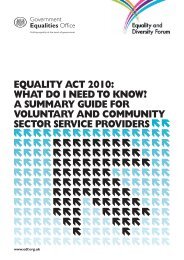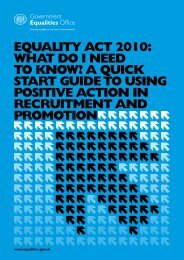Equality Act 2010: Public Sector Equality Duty what do I need to know?
Equality Act 2010: Public Sector Equality Duty what do I need to know?
Equality Act 2010: Public Sector Equality Duty what do I need to know?
- No tags were found...
Create successful ePaper yourself
Turn your PDF publications into a flip-book with our unique Google optimized e-Paper software.
EQUALITY ACT <strong>2010</strong>:PUBLIC SECTOREQUALITY DUTYWHAT DO I NEED TO KNOW?A QUICK START GUIDEFOR PUBLIC SECTORORGANISATIONSwww.equalities.gov.uk
This replaces previous guidanceon the public sec<strong>to</strong>r <strong>Equality</strong> <strong>Duty</strong>published by the GovernmentEqualities Offce on 12 January 2011.Please discard the previous guidance.IntroductionThe <strong>Equality</strong> <strong>Act</strong> <strong>2010</strong> (the <strong>Act</strong>) replaces theprevious anti-discrimination laws with a single<strong>Act</strong>. It simplifies the law, removing inconsistenciesand making it easier for people <strong>to</strong> understandand comply with it. It also strengthens the law inimportant ways, <strong>to</strong> help tackle discrimination andinequality. The majority of the <strong>Act</strong> came in<strong>to</strong> forceon 1 Oc<strong>to</strong>ber <strong>2010</strong>.This quick start guide is intended <strong>to</strong> help publicsec<strong>to</strong>r organisations understand a key measure inthe <strong>Act</strong> – the public sec<strong>to</strong>r <strong>Equality</strong> <strong>Duty</strong>,which came in<strong>to</strong> force on 5 April 2011. The <strong>Equality</strong><strong>Duty</strong> ensures that all public bodies play their part inmaking society fairer by tackling discrimination andproviding equality of opportunity for all.Sources of further information about the <strong>Equality</strong><strong>Duty</strong> are listed at the end of the guide.
The <strong>Equality</strong> <strong>Duty</strong>The <strong>Equality</strong> <strong>Duty</strong> has three aims. It requires publicbodies <strong>to</strong> have due regard <strong>to</strong> the <strong>need</strong> <strong>to</strong>:• eliminate unlawful discrimination,harassment, victimisation and any other conductprohibited by the <strong>Act</strong>;• advance equality of opportunity betweenpeople who share a protected characteristic andpeople who <strong>do</strong> not share it; and• foster good relations between people whoshare a protected characteristic and people who<strong>do</strong> not share it.Having due regard means consciously thinkingabout the three aims of the <strong>Equality</strong> <strong>Duty</strong> as par<strong>to</strong>f the process of decision-making. This means thatconsideration of equality issues must influence thedecisions reached by public bodies – such as in howthey act as employers; how they develop, evaluateand review policy; how they design, deliver andevaluate services, and how they commission andprocure from others.Having due regard <strong>to</strong> the <strong>need</strong> <strong>to</strong> advanceequality of opportunity involves considering the<strong>need</strong> <strong>to</strong>:• remove or minimise disadvantages suffered bypeople due <strong>to</strong> their protected characteristics;• meet the <strong>need</strong>s of people with protectedcharacteristics; and• encourage people with protected characteristics<strong>to</strong> participate in public life or in other activitieswhere their participation is low.Fostering good relations involves tacklingprejudice and promoting understanding betweenpeople who share a protected characteristic an<strong>do</strong>thers.Complying with the <strong>Equality</strong> <strong>Duty</strong> may involvetreating some people better than others, as far asthis is allowed by discrimination law. For example,it may involve making use of an exception or thepositive action provisions in order <strong>to</strong> provide aservice in a way which is appropriate for people whoshare a protected characteristic – such as providingcomputer training <strong>to</strong> older people <strong>to</strong> help themaccess information and services.Taking account of disabled people’sdisabilitiesThe <strong>Equality</strong> <strong>Duty</strong> also explicitly recognises thatdisabled people’s <strong>need</strong>s may be different fromthose of non-disabled people. <strong>Public</strong> bodiesshould therefore take account of disabled people’simpairments when making decisions about policiesor services. This might mean making reasonableadjustments or treating disabled people better thannon-disabled people in order <strong>to</strong> meet their <strong>need</strong>s.ExampleA university might decide <strong>to</strong> providecar parking spaces for disabled studentsso that those who cannot use publictransport because of their impairmenthave equality of opportunity in access<strong>to</strong> courses. Although non-disabledstudents might also want a parking space,they will not suffer the same degree ofdisadvantage without one.4
Implementing the <strong>Equality</strong> <strong>Duty</strong><strong>Public</strong> bodies <strong>need</strong> <strong>to</strong> consciously think aboutthe three aims of the <strong>Equality</strong> <strong>Duty</strong> as part of theprocess of decision-making. The <strong>Equality</strong> <strong>Duty</strong> willbe one of a number of fac<strong>to</strong>rs that <strong>need</strong> <strong>to</strong> beconsidered. The weight given <strong>to</strong> the <strong>Equality</strong> <strong>Duty</strong>,compared <strong>to</strong> the other fac<strong>to</strong>rs, will depend on howmuch that function affects discrimination, equalityof opportunity and good relations and the extent ofany disadvantage that <strong>need</strong>s <strong>to</strong> be addressed.The following principles, drawn from case law,explain <strong>what</strong> is essential in order for the <strong>Equality</strong><strong>Duty</strong> <strong>to</strong> be fulfilled. <strong>Public</strong> bodies should ensure:Knowledge – those who exercise the public body’sfunctions <strong>need</strong> <strong>to</strong> be aware of the requirements ofthe <strong>Equality</strong> <strong>Duty</strong>. Compliance with the <strong>Equality</strong> <strong>Duty</strong>involves a conscious approach and state of mind.Timeliness – the <strong>Equality</strong> <strong>Duty</strong> must be compliedwith before and at the time that a particular policyis under consideration or decision is taken – that is,in the development of policy options, and in makinga final decision. A public body cannot satisfy the<strong>Equality</strong> <strong>Duty</strong> by justifying a decision after it hasbeen taken.Suffcient information – the decision makermust consider <strong>what</strong> information he or she has and<strong>what</strong> further information may be <strong>need</strong>ed in order <strong>to</strong>give proper consideration <strong>to</strong> the <strong>Equality</strong> <strong>Duty</strong>.No delegation – public bodies are responsiblefor ensuring that any third parties which exercisefunctions on their behalf are capable of complyingwith the <strong>Equality</strong> <strong>Duty</strong>, are required <strong>to</strong> comply withit, and that they <strong>do</strong> so in practice. It is a duty thatcannot be delegated.Review – public bodies must have regard <strong>to</strong> theaims of the <strong>Equality</strong> <strong>Duty</strong> not only when a policyis developed and decided upon, but also when it isimplemented and reviewed. The <strong>Equality</strong> <strong>Duty</strong> is acontinuing duty.Demonstrating compliance with the<strong>Equality</strong> <strong>Duty</strong>There is no explicit requirement <strong>to</strong> refer <strong>to</strong>the <strong>Equality</strong> <strong>Duty</strong> in recording the process ofconsideration but it is good practice <strong>to</strong> <strong>do</strong> so.Keeping a record of how decisions were reached willhelp public bodies demonstrate that they consideredthe aims of the <strong>Equality</strong> <strong>Duty</strong>.Real consideration – consideration of the threeaims of the <strong>Equality</strong> <strong>Duty</strong> must form an integral par<strong>to</strong>f the decision-making process. The <strong>Equality</strong> <strong>Duty</strong>is not a matter of box-ticking; it must be exercisedin substance, with rigour and with an open mind insuch a way that it influences the final decision.5
Who <strong>need</strong>s <strong>to</strong> be involved?It is important for people throughout public bodies <strong>to</strong> be aware of the <strong>Equality</strong> <strong>Duty</strong>.These include:• Board members – in how they set strategicdirection, review performance and ensure goodgovernance of the organisation.• Senior managers – in how they oversee thedesign, delivery, quality and effectiveness ofthe organisation’s functions.• <strong>Equality</strong> and diversity staff – in how they raiseawareness and build capacity about the<strong>Equality</strong> <strong>Duty</strong> within the organisation andhow they support staff <strong>to</strong> deliver on theirresponsibilities.• Human resources staff – in how they buildequality considerations in employment policiesand procedures.• Policy makers – in how they build equalityconsiderations in all stages of the policy makingprocess including review and evaluation.• Communications staff – in how they ensureequality information is available and accessible.• Analysts – in how they support the organisation<strong>to</strong> understand the effect of its policies andpractices on equality.• Front line staff – in how they use equalityconsiderations in the delivery of services <strong>to</strong>the public.• Procurement and commissioning staff – inhow they build equality considerations in theorganisation’s relationships with suppliers.6
The <strong>Equality</strong> <strong>Duty</strong> in practiceThe <strong>Equality</strong> <strong>Duty</strong> ensures that public bodiesconsider the <strong>need</strong>s of all individuals in their day <strong>to</strong>day work. The following examples show how the<strong>Equality</strong> <strong>Duty</strong> could help public bodies contribute <strong>to</strong>making society fairer by tackling discrimination andproviding equality of opportunity for all.ExampleA police authority, when reviewing itspolicy on hate crime, finds that 68% ofall hate crime reported is described asbeing homophobic. The police authoritytakes account of the extremely highoccurrence of hate crime on the localLGB population in drawing up andimplementing its new policy addressinghate crime.ExampleWhen reviewing the services it provides,a public transport service provider findsthat Sunday services are often usedby people going <strong>to</strong> religious services.Reducing the Sunday service wouldtherefore affect the ability of peoplebelonging <strong>to</strong> certain religious groups <strong>to</strong>attend those services. The transportservice provider considers this evidencealong with any other relevant fac<strong>to</strong>rs,such as the cost of providing the service,when arriving at its conclusions followingthe review.7
Common misunderstandings aboutthe <strong>Equality</strong> <strong>Duty</strong>Under the previous public sec<strong>to</strong>r equality duties (forrace, disability and gender), public bodies sometimes<strong>to</strong>ok unnecessary, inappropriate, disproportionate orcounter-productive action in the name of equality.The new <strong>Equality</strong> <strong>Duty</strong> should be applied in sucha way as <strong>to</strong> reverse the overly-bureaucratic andburdensome approach often used under theprevious duties, so that the focus is on performance,not process.4The <strong>Equality</strong> <strong>Duty</strong> <strong>do</strong>es not imposea legal requirement <strong>to</strong> conduct an<strong>Equality</strong> Impact Assessment 2 . Nor isthere is any practical <strong>need</strong> <strong>to</strong> conduct one.Compliance with the <strong>Equality</strong> <strong>Duty</strong> involvesconsciously thinking about the three aims ofthe <strong>Equality</strong> <strong>Duty</strong> as part of the process ofdecision-making. That will entail understandingthe potential effects of the organisation’sactivities on different people, but there is noprescribed process for <strong>do</strong>ing this. Keepinga simple record of how decisions werereached will help public bodies show how theyconsidered the <strong>Equality</strong> <strong>Duty</strong>. Producing an<strong>Equality</strong> Impact Assessment after a decisionhas been reached will not achieve compliancewith the <strong>Equality</strong> <strong>Duty</strong>.4The <strong>Equality</strong> <strong>Duty</strong> <strong>do</strong>es not mean thatpublic bodies have <strong>to</strong> examine equalityissues where they are not relevant<strong>to</strong> the matter in hand. Where it is clearfrom initial consideration that a policy willnot have any effect on equality for any of theprotected characteristics, no further analysisor action is necessary. For example, if a publicbody is conducting a review in relation <strong>to</strong> anissue which has no implications for equality –such as an evaluation of the effect of coastalpollution on marine life – undertaking a formalconsultation or analysis addressing equalityissues where it is evident that the <strong>Equality</strong><strong>Duty</strong> is not relevant would be pointless and isnot required.4The <strong>Equality</strong> <strong>Duty</strong> <strong>do</strong>es not requirepublic bodies <strong>to</strong> take disproportionateaction on equality. <strong>Public</strong> bodies shouldtake a proportionate approach whencomplying with the <strong>Equality</strong> <strong>Duty</strong> – in practice,this means giving greater consideration <strong>to</strong> the<strong>Equality</strong> <strong>Duty</strong> where a function or policy hasthe potential <strong>to</strong> have a substantial effect ondiscrimination or equality of opportunity forthe public or the public body’s employees, andless consideration where the potential effec<strong>to</strong>n equality is slight.For example, a public body might decide<strong>to</strong> translate a leaflet about a key publicservice in<strong>to</strong> a few commonly spokenminority languages, in order <strong>to</strong> ensurepeople from particular ethnic minoritycommunities have access <strong>to</strong> the service.2The specific duties which apply <strong>to</strong> relevant Welsh public bodies contain a requirement <strong>to</strong> make arrangements for assessing the likely impact oftheir activities on their ability <strong>to</strong> comply with the <strong>Equality</strong> <strong>Duty</strong>.8
But translating all of its public informationin<strong>to</strong> the 300 languages regularly spoken inLon<strong>do</strong>n would be a disproportionateresponse <strong>to</strong> the <strong>Equality</strong> <strong>Duty</strong>.4The <strong>Equality</strong> <strong>Duty</strong> <strong>do</strong>es not requirepublic bodies <strong>to</strong> treat everyone thesame. Rather, it requires public bodies <strong>to</strong>think about people’s different <strong>need</strong>s andhow these can be met. So the <strong>Equality</strong> <strong>Duty</strong><strong>do</strong>es not prevent public bodies providingwomen-only services – for example, forfemale victims of sexual violence or <strong>do</strong>mesticviolence. Indeed, such services may benecessary in order <strong>to</strong> ensure women haveaccess <strong>to</strong> the services they <strong>need</strong>.4The <strong>Equality</strong> <strong>Duty</strong> <strong>do</strong>es not requirepublic bodies <strong>to</strong> treat all religions asbeing equal or <strong>to</strong> treat all religiousfestivals equally. For example, a publicbody displaying a Christmas tree every yearin its reception area would not be a breach ofthe <strong>Equality</strong> <strong>Duty</strong>.4The <strong>Equality</strong> <strong>Duty</strong> <strong>do</strong>es not requirepublic bodies <strong>to</strong> make serviceshomogeneous or <strong>to</strong> try <strong>to</strong> remove orignore differences between people.So, for example, it <strong>do</strong>es not mean that a publicbody must s<strong>to</strong>p providing age-appropriateservices for people of different ages, or thatit can no longer commission some services <strong>to</strong>be provided by different faith organisations.Faith organisations are sometimes well-placed<strong>to</strong> deliver services which meet the particular<strong>need</strong>s of their community.EnforcementThe <strong>Equality</strong> and Human Rights Commission isresponsible for assessing compliance with andenforcing the <strong>Equality</strong> <strong>Duty</strong>. It has powers <strong>to</strong> issuecompliance notices <strong>to</strong> public bodies that have failed<strong>to</strong> comply and can apply <strong>to</strong> the courts for an orderrequiring compliance. The <strong>Equality</strong> <strong>Duty</strong> can also beenforced by judicial review. This can be <strong>do</strong>ne by theCommission or any individual or group of peoplewith an interest.9
Specific DutiesSection 153 of the <strong>Act</strong> gives Ministers powers <strong>to</strong>impose specific duties on certain public bodies <strong>to</strong>enable them <strong>to</strong> perform the <strong>Equality</strong> <strong>Duty</strong> moreeffectively.A policy review paper outlining draft specific dutiesfor English public bodies and the non-devolvedfunctions of Great Britain wide bodies was publishe<strong>do</strong>n 17 March 2011. The draft specific duties focus onreducing burdens and bureaucracy on public bodies,moving away from a process-driven approach <strong>to</strong> afocus on transparency. This will free up public bodies<strong>to</strong> <strong>do</strong> <strong>what</strong> is appropriate in their circumstances,<strong>to</strong> take responsibility for their own performance,and <strong>to</strong> be held <strong>to</strong> account by the public, shiftingthe approach <strong>to</strong> give a focus on performance,not process. The policy review paper is availableat: http://www.equalities.gov.uk/pdf/110317%20<strong>Public</strong>%20sec<strong>to</strong>r%20<strong>Equality</strong>%20<strong>Duty</strong>%20-%20Policy%20review%20paper.pdf.Further sources of informationThe <strong>Equality</strong> and Human Rights Commission isthe statu<strong>to</strong>ry body established <strong>to</strong> help eliminatediscrimination and reduce inequality. It will producea statu<strong>to</strong>ry Code of Practice on the <strong>Equality</strong> <strong>Duty</strong>later in 2011, explaining the law in more detail. Itwill also produce practical guidance on how publicbodies can comply with the <strong>Equality</strong> <strong>Duty</strong> andachieve good practice:www.equalityhumanrights.com0845 604 6610General information about the Government’sequality strategy and legislation is available from theGovernment Equalities Offce at:www.equalities.gov.uk0303 444 1204The specific duties applying <strong>to</strong> relevant Welshpublic bodies came in<strong>to</strong> force on 6 April 2011.Further information can be found atwww.assemblywales.org. The specific dutiesapplying <strong>to</strong> relevant Scottish public bodies arecurrently being considered by the ScottishGovernment.10
© Crown copyright <strong>2010</strong>JN405930April 2011







